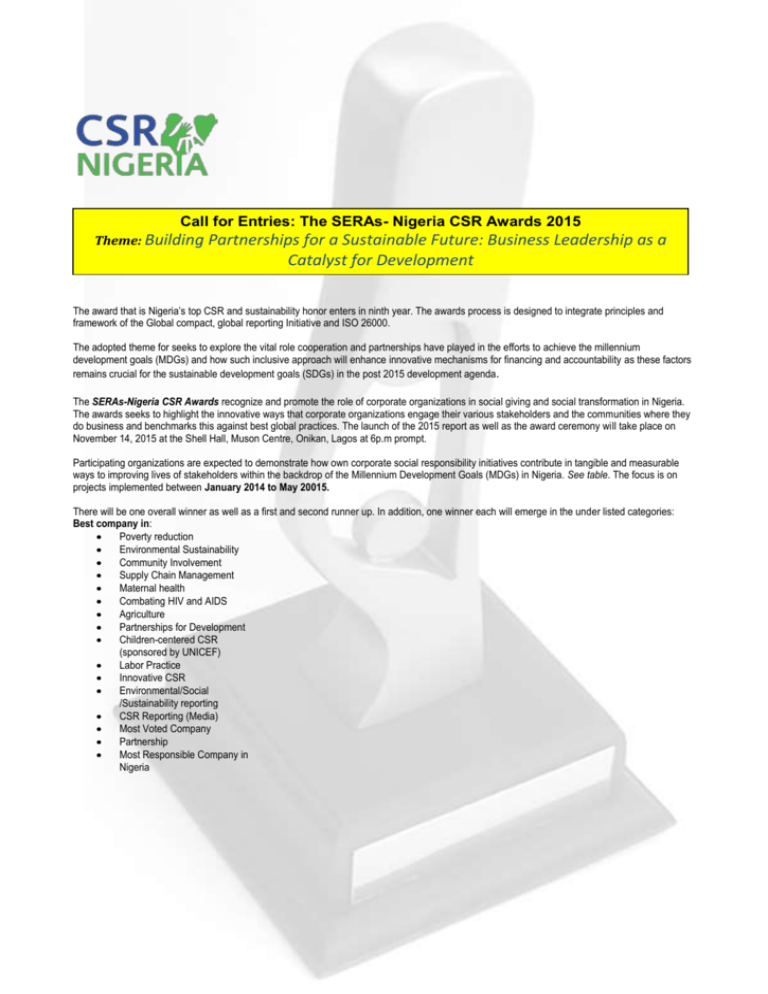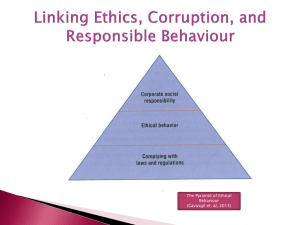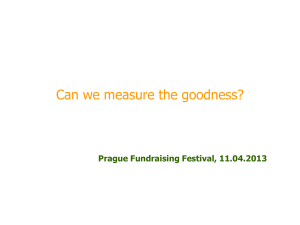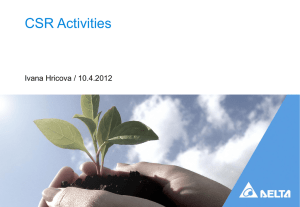"Large Organisations Entry" here.
advertisement

Call for Entries: The SERAs- Nigeria CSR Awards 2015 Theme: Building Partnerships for a Sustainable Future: Business Leadership as a Catalyst for Development The award that is Nigeria’s top CSR and sustainability honor enters in ninth year. The awards process is designed to integrate principles and framework of the Global compact, global reporting Initiative and ISO 26000. The adopted theme for seeks to explore the vital role cooperation and partnerships have played in the efforts to achieve the millennium development goals (MDGs) and how such inclusive approach will enhance innovative mechanisms for financing and accountability as these factors remains crucial for the sustainable development goals (SDGs) in the post 2015 development agenda. The SERAs-Nigeria CSR Awards recognize and promote the role of corporate organizations in social giving and social transformation in Nigeria. The awards seeks to highlight the innovative ways that corporate organizations engage their various stakeholders and the communities where they do business and benchmarks this against best global practices. The launch of the 2015 report as well as the award ceremony will take place on November 14, 2015 at the Shell Hall, Muson Centre, Onikan, Lagos at 6p.m prompt. Participating organizations are expected to demonstrate how own corporate social responsibility initiatives contribute in tangible and measurable ways to improving lives of stakeholders within the backdrop of the Millennium Development Goals (MDGs) in Nigeria. See table. The focus is on projects implemented between January 2014 to May 20015. There will be one overall winner as well as a first and second runner up. In addition, one winner each will emerge in the under listed categories: Best company in: Poverty reduction Environmental Sustainability Community Involvement Supply Chain Management Maternal health Combating HIV and AIDS Agriculture Partnerships for Development Children-centered CSR (sponsored by UNICEF) Labor Practice Innovative CSR Environmental/Social /Sustainability reporting CSR Reporting (Media) Most Voted Company Partnership Most Responsible Company in Nigeria Eligibility Corporate /commercial and non- profit organizations operating in Nigeria. Entry Requirements Complete the entry form online at www.sera-ng.com and submit; or download the entry form from the SERA website, complete and email as an attachment to 2015entry@sera-ng.com. Entries, together with supporting documents – pictures, newspaper clips, annual, social and sustainability reports etc. must be submitted no later than July 15, 2015. You may also mail entries and (or) supporting documents by courier to The SERAs-Nigeria CSR Awards, TruContact CSR Ltd, 30 Shakiru Anjorin, Off Admiralty Way, Lekki Phase 1, Lagos (provided the documents arrive on or before the closing date). Millennium Development Goals (MDGs) and examples of programmatic focal areas G1 Poverty Reduction Examples Examples *Agriculture *SMEs *Rural Industrialization *Economic empowerment G5 Maternal Health *Antenatal care G2 Universal Primary Education *UBE *Mass Literacy *Girl Child *Education Infrastructure G3 Gender Equality G4 Child Health *Girls Education *Women in Politics *Immunization *Nutrition programs *Child spacing *Early marriage G6 Combat HIV/AIDS, Malaria etc. G7 Environment Sustainability *Orphans and * Safe water G8 Partnerships For Development *Agriculture processing and exports * ICTs *Safe vulnerable children *Sanitation The Assessment Process motherhood * VCT *Waste Names of short listed organizations will be uploaded on the awards programs *PMTCT Management website and Nigerians will be called upon to vote on a national level, *ARVs *Energy names of companies that they perceive to be role models in their *ITNs Saving *TB DOTS *Resource corporate social responsibility operations and performance in the Saving (e.g. various categories. The organizers will also monitor and verify claims use of paper) made by participating organizations. The verification exercise will involve visits to the cited project locations identified by short listed companies, and interviews with beneficiaries and stakeholders. The final selections will be done by a panel of judges, made up of eminent Nigerians and non-Nigerians, active and distinguished as professionals with impeccable records. Please complete the form below. If completed online, the boxes will expand to accommodate your information. If completed offline, additional sheets may be used. Please note that the maximum total number of pages allowable is seven (7 pages). CONTACT INFORMATION Name Title Organization Address Telephone Email Name of CEO 1. Policy on Social/Ethical/Environmental Issues Website 1a. Organizations’ vision and mission statements 1b. Corporate policy that governs social/ethical and environmental matters. Please provide title of policy as well the date it became operational 1c. What are the specific areas addressed by your policy (tick as many that apply): * Environmental protection (Industrial pollution) * employee welfare /rights safety * Human resource development *gender / equal opportunity /human rights poverty reduction *Community/rural & agriculture development * Health * Education * None of the above *Other (please describe): __________________________________________________________________________________________________________ 1d. How does your organization deal with the issue of corruption? 1e. Indicate the level of the committee that takes the decisions regarding social/ethical and environmental matters: Board Senior /Junior Management CSR Department * 1f. Please indicate percentage of 2014 income assigned to CSR portfolio 2. CSR Strategic Approach / Strategy 2a. Please summarize your organization’s CSR approach including the focus, target groups and the expected benefits or results 2b Which Social Accounting (SA) standard(s) has your organization adopted: AA1000 SA 8000 Global Reporting Initiative’s Sustainability Guidelines Other _____________________________________________ None The SERAs - Nigeria CSR Awards 2015 Theme: ‘Building Partnerships for a Sustainable Future: Business Leadership as a Catalyst for Development.’ Cross-sector partnerships are progressively being seen as a crucial development method for the 21st Century and are seen as the most efficient way to deal with challenges that have overpowered the single-sector interventions. A high number of partnership initiatives under development have shown that cross-sector collaboration can be very effective and sustainable in achieving global sustainable development. The cross-sector partnership between governments, the private sector and civil society was high on the agenda since the UN Conference on Environment and Development - the Rio Earth Summit in 1992 and later in Johannesburg in 2002. The research conducted by University of Cambridge Institute for Sustainability and Leadership (CISL) concludes that, if we are trusting on partnerships to achieve sustainable development impacts, then they need to be firmly tied into genuinely comprehensive consultation processes, that operate within accountability frameworks, be properly supported and evaluated, and lead ultimately to policy change (Findlay-Brooks, Visser & Wright 2007). The following table can be part of the application form for completion by participants, with 0 = not in place, 1 = in development; 2 = in place Use table and tick as appropriate indicating areas being addressed by your organization. Attach/ submit evidence to support your claim and label according to number references below, along with completed table, with your entry form. ALL evidences will be investigated and verified by Jury team. ISO 26000 on Social Responsibility - Core Subjects Management System Components Type of Evidence Organizational Governance Human Rights Labor (Employment) Practices The Environment Fair Operating Practices (Anti corruption) Consumer Issues Community Involvement & Development Policy Copy of policy 1.1 2.1 3.1 4.1 5.1 6.1 7.1 Legal Register Voluntary Codes (Where applicable) Objectives List of relevant legislation Copy of certificate of adoption 1.2 1.3 2.2 2.3 3.2 3.3 4.2 4.3 5.2 5.3 6.2 6.3 7.2 7.3 List of objectives 1.4 2.4 3.4 4.4 5.4 6.4 7.4 Targets List of targets 1.5 2.5 3.5 4.5 5.5 6.5 7.5 Programs or projects Financial Resources List of projects 1.6 2.6 3.6 4.6 5.6 6.6 7.6 Budget 1.7 2.7 3.7 4.7 5.7 6.7 7.7 Human Resources Board Director Number of staff 1.8 2.8 3.8 4.8 5.8 6.8 7.8 Name of Director 1.9 2.9 3.9 4.9 5.9 6.9 7.9 Senior Manager Name of Senior Manager 1.10 2.10 3.10 4.10 5.10 6.10 7.10 Training List of training courses and number of attendees Database of KPIs (should link to objectives and targets) 1.11 2.11 3.11 4.11 5.11 6.11 7.11 1.12 2.12 3.12 4. 12 5.12 6.12 7.12 Internal Reporting List of Internal reports compiled 1.13 2.13 3.13 4.13 5.13 6.13 7.13 External (Public) Reporting Copy of Reports 1.14 2.14 3.14 4.14 5.14 6.14 7.14 Audits 1.15 2.15 3.15 4.15 5.15 6.15 7.15 Board Review Conducted List of audits conducted (dates and auditors used) Date of reviews (Board minutes) 1.16 2.16 3.16 4.16 5.16 6.16 7.16 Cross Sector Partnerships List of Partners and copies of MOU 1.17 2.17 3.17 4.17 5.17 6.17 7.17 Financial mechanism Details of loan, donation, sponsorship or investment programme 1.18 2.18 3.18 4.18 5.18 6.18 7.18 Performance Data (KPIs) Section 3 i. Give an overview of your company/organization ii. What cross-sector partnerships is your company/organization engaged in? iii. Give details of partnership project – list the partners involved and length of partnership iv. What is the aim of the project/program? v. What are the financial mechanisms that you have put in place? vi. What have been the measurable outcomes and impacts? Section 4 Overall Winner (Best Partnership Award) The following questions drawn from the Partnering Tool Book developed by International Business Leaders Forum (IBLF) will assist the panel with internal assessment: 1. What is the innovative partnership approach used by the company/organisation? 2. What are the mechanisms that enabled each partner/sector to achieve both common and complementary goals more effectively, legitimately and sustainably? 3. How do they access and draw on the full range of technical, human, knowledge, physical and financial resources found within all sectors? 4. What is the dynamic of their networks and do they offer each sector better channels of engagement with the wider community and greater capacity to influence the policy agenda? 5. What is their understanding of the value, values and attributes of each sector thereby building a more integrated and a more stable society? 6. Is the partnership doing what it set out to do – has the project or program of activities achieved preagreed objectives? 7. Is the partnership having impact beyond its immediate stakeholder group? (Are there any recognition of achievement from project beneficiaries, key others and / or the wider community) 8. Is the partnership sustainable and self-managing - either through the continuing engagement of partner organizations or through a self-sustaining mechanism that has replaced the partnership, enabling partners to move on to other things? 9. What is the ‘added value’ in which individual partners have gained significant benefits - partner organizations have established new ways of working with other sectors and / or have had their own systems and operational styles improved? 10. Has the partnership made a useful contribution to the global partnership movement? 11. What makes this program innovative? 12. How has partnership enabled this program to generate results beyond what the company could otherwise achieve?








